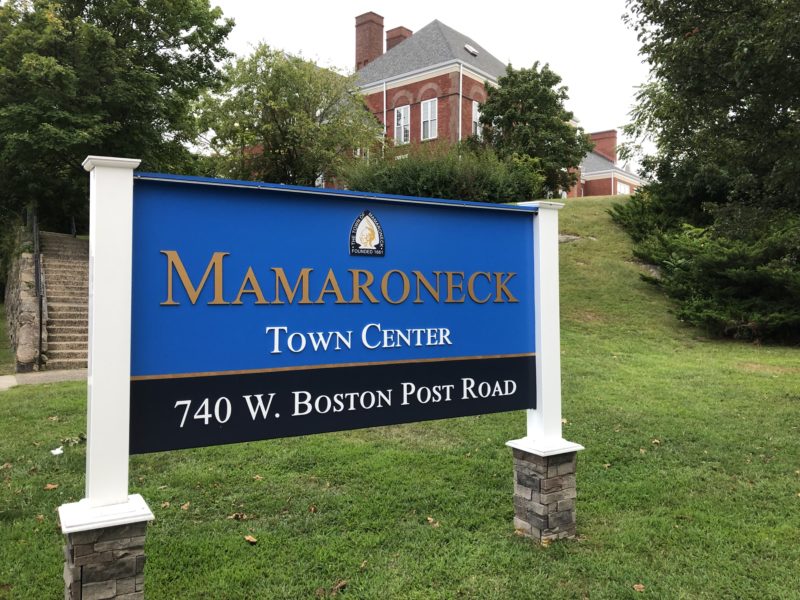Our School System Should Encourage Activism
March 15, 2021
Between the Presidential Election, the recent riots at Capitol Hill, the Black Lives Matter movement, and a plethora of other recent political controversies, it isn’t hard to see current events around the country leaking into student life. And, as Mamaroneck students debate their political opinions inside and outside the classroom, one has to balance the extent to which politics should be discussed at school. For a long time, it seems the district has provided us with ample information to formulate our own opinions based on historical information and governmental order. But as we approach voting age, should we be allowed to advocate for our stances frequently within the classroom? Or should such controversial conversations take place outside of school premises?
In the opinion of most students, politics should be a prevalent topic of debate at Mamaroneck. A poll answered by 450 MHS students revealed that 70 percent of students stand strongly behind this opinion and a minor 30 percent of them claim otherwise. Meanwhile, an impressive 75 percent of students claimed they are politically active while a mere 25 percent of them disagreed with this statement. The results of these numbers can be seen through involvement in protests, spread of petitions, participation in OCRA, civically and politically associated clubs, and many other organizations in which Mamaroneck’s youth not only assert their political beliefs but fight for them, spurring change in our local community and at times, even across the state.
Despite these accomplishments, students do face a fair amount of restrictions in advocating for their beliefs, some of them necessary, some of them flexible. One of the most restrictive yet unknown constraints of politics in the classroom is actually a strict curriculum, which often leaves little time for debate. In History and English classes, controversial subjects might arise, but student debate is almost never prioritized above ensuring that classes stay up to schedule with annual curriculums.
The concept of politics in the classroom is far more complicated for MHS teachers and staff. Whereas other schools are more rigid about introducing politics into the classroom, Mamaroneck does afford teachers the right to introduce students to an early form of democracy, to grant them free speech. Beginning at an elementary level, teachers hold four corner debates and socratic seminars in Humanities classes, slowly expanding these exercises into more complex social and political discussions. In AP courses, such as U.S. History, Language and Composition, and U.S. Government, controversial texts and topics are discussed and classrooms often provide for open floor debates.
While students may face some restrictions in discussing politics in the classroom, teachers can fall into much more trouble for what takes place during political conversation in their classrooms. The New York State School Boards Association has instituted time and time again that all students deserve the right to attend a school free of partisan political influence. Thus, teachers must not force their political opinions on those they are teaching. However, this raises the question, when it is appropriate for a teacher to insert their own ideas and when isn’t it?
Sometimes, teachers’ ideas can help a child to develop his or her stance but, at other times, it can be seen as a form of indoctrination. As a result, many schools ban teachers from wearing badges in support of political candidates they appreciate and from bringing unprompted political debate into the classroom. In certain cases, it is also difficult for teachers to express their political views at all when what they believe is not supported by the community. According to the Pacific Research Institute, most teachers within the United States are liberal, and not by a small percentage. Thus, depending on where a teacher is applying for a job, they may need to exaggerate or hide their political views. In addition, while many students disapprove of strict curriculum, it often isn’t very popular among educators either. It seems despite however much freedom we have, we always want more.
Opinions based on whether politics should be introduced into school can not be solely determined by numbers as there are many influential factors in the decision. When confronted with this topic, MHS Junior Donnie Gomez replied, “It depends if you’re in [history], then yes. If you’re in any other class, then I don’t think it’s necessary.”
Mackenzie Minguillo (‘21) also has a mixed opinion about this, describing how she encounters politics in the classroom.. “I take macro right now,” she says, “and usually we incorporate politics in our studies and debate… government systems. But, we get assigned into different groups to defend socialism and capitalism and I feel like if the groups were divided among our terms [ based on students beliefs] and not the teachers, there’d be some division with students,” she says. Junior Maya Gadlin also made the point that “Human rights now fall under political opinions rather than natural rights, so it has to be discussed if we want to study what it means to be America or to be Patriotic” in the classroom.
“Often, talking about human rights or political differences can make people (adults AND students) uncomfortable,” Ms. Silverman, an english teacher at MHS, says. “Sometimes that discomfort comes from a good place; we don’t want to risk offending anyone or hurting someone. However, discomfort can be a sign of learning or being challenged. Practice in this kind of conversation can help youth be more equipped to have knowledgeable, respectful conversations as future college students and job-seekers.”
In the end, despite the tension or uncomfort politics may bring into the classroom, it is important that students feel free to express their ideas. Developing political identity at an early age is very important and whether or not controversial topics are allowed into the classroom will also play a very big role in how students learn to see the world. With so much responsibility, it is important that the Mamaroneck High School administration doesn’t ignore this and makes an effort to discuss politics in the classroom. Helping young adults build their own opinions and stances is one of the best things that educators can do for the future.







